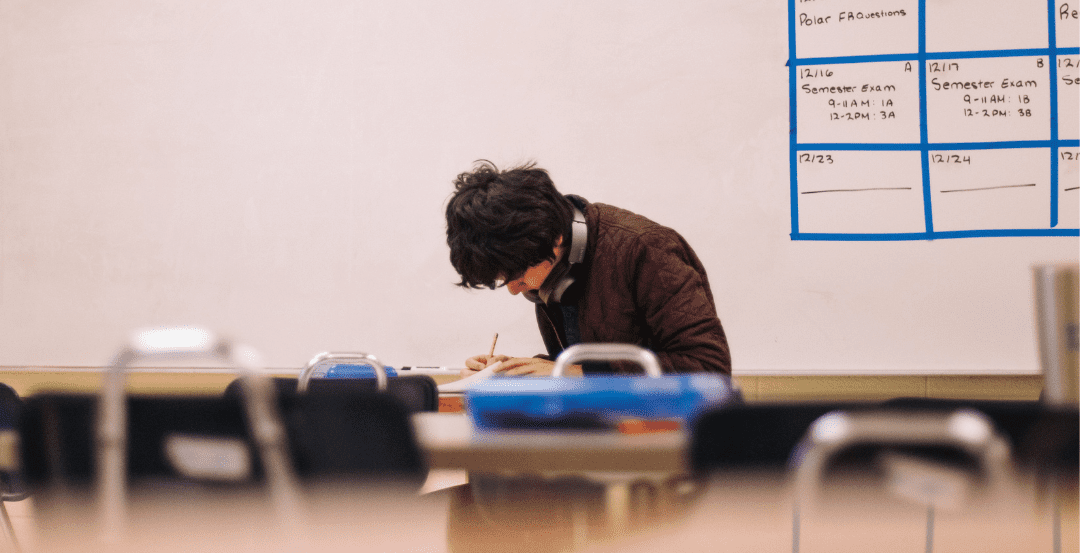Faced with exam season at university, it is inevitable to feel anxiety and nerves. And this is normal, as we are faced with the uncertainty of what we may face at the time of the assessment.
However, we should be concerned when this level of anxiety affects our ability to concentrate on the assessments, our memory capacity or even our daily routine; therefore, we dedicate this post to identifying when anxiety is present and how to control it during these stages.
How do I know if I have anxiety?
Anxiety and nerves generate a series of effects on a psychological, physical and emotional level. Some of the symptoms you might experience if you have anxiety, are:
On a psychological level:
- Negative thoughts.
- Mental block or temporary memory loss.
- Not being able to make decisions at a certain moment.
On a physical level:
- Insomnia.
- Difficulty concentrating.
- Stomach aches or headaches.
- Nausea at the time of the exam or even vomiting.
- Feeling of a knot in the stomach or uncontrollable urge to go to the toilet.
Emotionally:
- Restlessness.
- Constant nervousness.
- Excessive worrying.
- Constant anger over things that make no sense.
If you have any of these symptoms, you are probably going through a stage of anxiety.
Why am I in this state?
Anxiety and nerves about exam season is a natural reaction that can be experienced when, as students, we anticipate stressful or even scary situations. You may be experiencing it because you have had bad experiences in the past, such as blocking or failing a very important exam.
There may also be a lot of negative thoughts about the subject, because you find it too complicated, or because you think that the instructor is too strict and will ask questions that are too difficult to answer in the exam.
In this sense, it is something that comes from the mindset and can be controlled with some practice. However, it is important to distinguish anxiety from worrying about not having studied enough or having had a bad day, as these are completely different situations.
What to do before exams?
If you think you are suffering from nerves, you can try some of the following practices before you take your exam.
- Practice study techniques that help you systematise the content you want to study and find strategies to memorise or understand more easily.
- Study in advance, don’t pretend to understand everything in just a few hours before the exam.
- Study in quiet and relaxed places, so that you can concentrate. Avoid being too distracted by electronic devices.
- Talk to your teacher about the subject matter and structure of the exam, so that you are sure about the content of the exam and can prepare properly.
- Learn and practice relaxation techniques such as deep breathing, relaxing your muscles or thinking positive thoughts. This will help if you get blocked in your exams.
- Finally, don’t forget to stick to your routine, eat well, even exercise, and get enough sleep in the days leading up to the exam to avoid stress and physical strain.
If you think your anxiety situation is too complicated, then seek professional help for more specialised guidance.
What to do during the exams?
Once you have prepared properly, it does not mean that anxiety cannot attack you during exam time. You will now need to practice the following to counteract anxiety on the day of the exam.
- Stay calm and control your thoughts from the start. You may start to think that everything will go wrong when you look at the exam, but this is where you should put your relaxation techniques into practice. You can even talk to yourself with phrases like «calm down, everything will be fine», «I am ready and I can do it» or «concentrate, you know the answers».
- Read each question carefully, if you have doubts about any of the questions, clarify them with the instructor and then start by answering the ones you consider easier.
- If you get stuck at any point, move on to the next question and continue answering clearly and confidently.
- Finally, if you feel it is necessary, wear a watch so that you can keep track of your time in the exam, but if this causes you anxiety, don’t do it.
You are not alone, there are other students with anxiety
As a final point, you need to know that you are not the only person who may be suffering from nerves as exam season approaches. There are many students who may experience this feeling.
The best thing you can do is to have study groups where you can share your experiences, so that you can build alliances and even make routines to help you get through it together.
¡Haz click para puntuar esta página!
Es muy importante para nosotros que puntúes nuestro trabajo para poder seguir mejorando. Tus opiniones ayudan al resto de estudiantes a encontrar nuestra página web.






